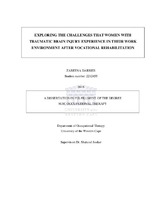Exploring the challenges that women with traumatic brain injury experience in their work environment after vocational rehabilitation
Abstract
Traumatic brain injury (TBI) has enjoyed extensive research and several therapeutic modalities, approaches and models have been developed where the main outcomes are focused on the successful return to work of individuals with brain injury. Research into women with TBI has, however, been negligible compared to research into the young adult male population. Gaining insight into how women with traumatic brain injury participate in their work environment would contribute valuable feedback to clinicians utilising return to work approaches and models. The study aimed to explore the challenges women who sustained TBI experience in the work environment after vocational rehabilitation. A qualitative research design was used to explore these experiences and perceptions from ten female participants. The method of data collection used to access the experiences and perceptions of the participants was in-depth semi-structured interviews. Furthermore semi-structured interviews were conducted with two occupational therapist, who were selected as key informants. The data from the study was analysed using thematic analysis. The study further aimed to obtain the participants` perceptions and experiences of barriers and facilitators as well as adaptation processes that influenced their ability to resume their work roles. Four themes originated from the findings of this study. Theme one describes the barriers experienced by women with TBI while returning to work in the form of barriers to work participation for women with TBI, loss of functional capacity hindering return to work, experiences of negative stigma and exploitation in the workplace, and contextual hindrances in the form of parental roles as well as public transportation systems. Theme two describes the factors that facilitated the resumption of the work role for women with TBI. Reestablishing a worker identity by means of vocational rehabilitation, utilising the Model of Occupational Self-Efficacy (MOOSE) as an approach, enabled the women with TBI to overcome their barriers and return to work. Theme three describes an inherent adaptation process where participants could come to terms with their losses, accept the present self and aspire towards a future self, by utilising personalised response approaches to overcome demands and challenges in the work context as well as experiencing success at work by adapting to the work environment. Theme four describes the participants’ views of changes needed in the rehabilitation program and services as well as policies that would aid in the quick return of women with TBI to productive roles. These suggestions are discussed as attainable through developing a multi-dimensional rehabilitation program for women with TBI as well as partnering with relevant stakeholders in the promotion of work opportunities for women with disabilities. The Model of Occupational Adaptation (MOA) was used as a framework to interpret the findings of this study; the barriers, facilitators and adaptation process were assessed as they impact on the experiences of the women with TBIs return to work. The return to work of the women with TBI was not observed only to be influenced by the personal characteristics but also by the environmental context within which the return to work process took place.

